
Zadar, historically known as Zara, is the oldest continuously inhabited city in Croatia. It is situated on the Adriatic Sea, at the northwestern part of Ravni Kotari region. Zadar serves as the seat of Zadar County and of the wider northern Dalmatian region. The city proper covers 25 km2 (9.7 sq mi) with a population of 75,082 in 2011, making it the second-largest city of the region of Dalmatia and the fifth-largest city in the country.

The siege of Zara or siege of Zadar was the first major action of the Fourth Crusade and the first attack against a Catholic city by Catholic crusaders. The crusaders had an agreement with Venice for transport across the sea, but the price far exceeded what they were able to pay. Venice set the condition that the crusaders help them capture Zadar, a constant battleground between Venice on one side and Croatia and Hungary on the other, whose king, Emeric, pledged himself to join the Crusade. Although some of the crusaders refused to take part in the siege, the attack on Zadar began in November 1202 despite letters from Pope Innocent III forbidding such an action and threatening excommunication. Zadar fell on 24 November and the Venetians and the crusaders sacked the city. After wintering in Zadar, the Fourth Crusade continued its campaign, which led to the siege of Constantinople.
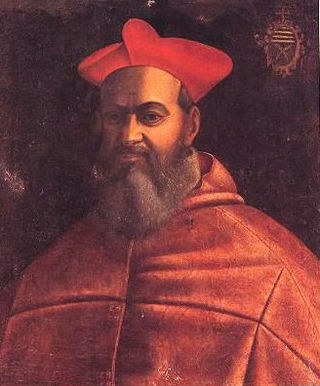
Scipione Rebiba was an Italian prelate of the Catholic Church, a protégé of Gian Pietro Carafa, who became Pope Paul IV. He held a variety of positions in the Church hierarchy, including some of the most senior. He introduced the Inquisition to Naples in the 1550s and became a cardinal in 1555. He is mostly known today for having been the earliest bishop to whom most Roman Catholic bishops can trace their apostolic succession, as it is unknown who consecrated Rebiba.

The Archdiocese of Zadar is a Latin Church ecclesiastical territory or archdiocese of the Catholic church in Croatia. The diocese was established in the 3rd century AD and was made an archdiocese by the Pope Anastasius IV in 1154. Today, it is not part of any ecclesiastical province of Croatia, rather it is only Croatian archdiocese directly subject to the Holy See.
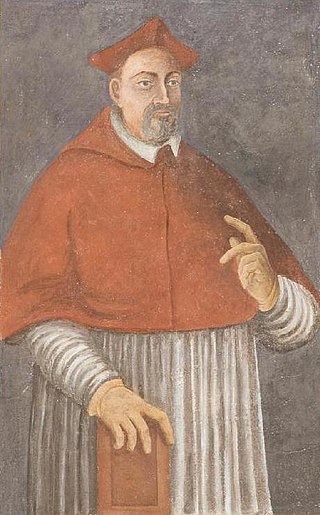
Francesco Pisani was an Italian Cardinal, born in Venice, the son of Alvise Pisani the noted banker, who was Procurator of S. Mark's, a member of the Council of Ten, and a Councilor of the Doge of Venice; and Cecilia Giustinian. He had a brother named Giovanni (Zuan), who also became Procurator of S. Marks' and was a Venetian diplomat; he was married to the sister of Doge Andrea Gritti. He was a strong supporter of the alliance between Venice, France and the Papacy, called the League of Cognac. He shared the imprisonment of Pope Clement VII in the Castel S. Angelo during the Sack of Rome and its aftermath. He spent eighteen months in exile in Naples while Clement made his peace with the Emperor Charles V.

The House of Loredan is a Venetian noble family of supposed ancient Roman origin, which has played a significant role in shaping the history of the entire Mediterranean. A political dynasty, the family has throughout the centuries produced a number of famous personalities: doges, statesmen, magnates, financiers, diplomats, procurators, military commanders, naval captains, church dignitaries, writers, and lawyers.
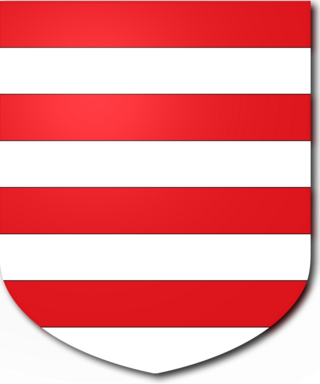
The House of Venier was a prominent family in the Republic of Venice who entered the Venetian nobility in the 14th century.
This article presents a detailed timeline of the history of the Republic of Venice from its legendary foundation to its collapse under the efforts of Napoleon.
Luigi Cornaro was an Italian Roman Catholic cardinal and bishop.
Pavao Posilović was a Bosnian-Herzegovinian and Croatian prelate of the Catholic Church who served as the bishop of Duvno from 1655 to his death in 1658. Previously, he served as the bishop of Skradin from 1642 to 1655 and from 1644, he was entrusted with the pastoral care of the Catholics in several dioceses under the Ottoman rule.
Vicko Zmajević was the Roman Catholic archbishop of Bar and Primate of Serbia and also the archbishop of the Archdiocese of Zadar.
Gerolamo Ragazzoni or Gerolamo Regazzoni was an Italian renaissance humanist and Roman Catholic prelate who served as Bishop of Bergamo (1577–1592), Apostolic Nuncio to France (1583–1586), Bishop of Novara (1576–1577), Apostolic Administrator of Kisamos (1572–1576), Coadjutor Bishop of Famagusta (1561), and Titular Bishop of Nazianzus (1561).
Bernardo Florio, O.Cruc. was a Roman Catholic prelate who served as Archbishop of Zadar (1621–1642) and Bishop of Canea (1642–1656).
Alvise Molino was a Roman Catholic prelate who served as Archbishop of Treviso (1595–1604) and Archbishop of Zadar (1592–1595).
Loredan is a Venetian surname. The House of Loredan is an aristocratic Venetian family that included various doges of the Republic of Venice, and the surname is almost exclusively associated with the family. The surname most likely originated from the toponym Loreo, which itself originated from its Latin name Lauretum, meaning laurel. Another theory of the origin of the surname, though most likely legendary, is that it comes from the Latin epithet Laureati, given to ancestors of the Loredan family due to their historical glory in ancient Rome and the many victories they achieved in battles. The surname is spelled Loredano or Loredan in Italian, Lauredano or Lauredanus in Latin, and Lorentano (Λορεντάνο) in Greek, though it is also historically found as Lordas (Λορδᾶς) and Lordano (Λορδάνο). The feminine name Loredana, common in Italy and Romania, was likely inspired by the surname.
Giacomo Loredan (1396-1471) was a Venetian nobleman, admiral and military general of the Loredan family, who served as Captain of the Gulf and three times as Captain General of the Sea in the Venetian Navy.
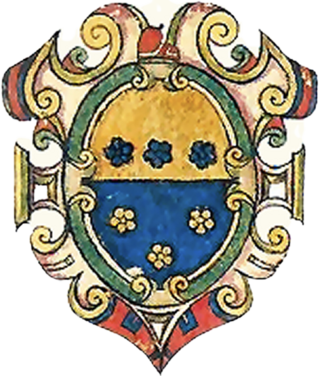
The House of Loredan-Santa Maria is a cadet branch of the noble House of Loredan which has produced many politicians, diplomats, military generals, naval captains, church dignitaries, writers and lawyers, and has played a significant role in the creation of modern opera with the Accademia degli Incogniti, also called the Loredanian Academy. The branch draws its name from the parishes of Santa Maria Formosa and Santa Maria dei Miracoli in Venice, around which it was historically settled. The progenitor of the branch is considered to be the famous admiral and procurator Pietro Loredan (1372-1438) by his sons Giacomo and Polo.
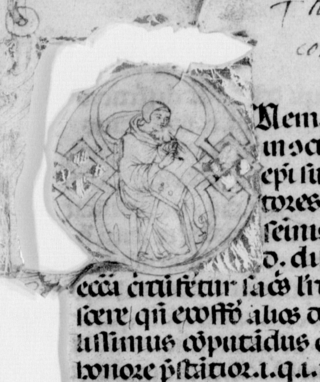
Nicolò Matafari was the archbishop of Zadar (Zara) in the Kingdom of Hungary from 1333 until his death. When his city came under the control of the Republic of Venice in 1346, he went into exile until 1358. A native of Zadar and a lawyer by training, Matafari was appointed the vicar general of the diocese of Padua in 1320, 1345 and 1355. He also served as vicar of the diocese of Castello in 1331.

Maffeo Vallaresso or Valaresso (1415–1494) was a Venetian patrician, Renaissance humanist and prelate who served as the archbishop of Zadar (Zara) from 1450 until his death. A doctor in canon law and a collector of Greek and Latin manuscripts, he tried unsuccessfully on at least four occasions to be transferred to a more prestigious see.
Nikola Ugrinović was a Croat prelate of the Catholic Church who served as a titular bishop of Smederevo and the apostolic administrator of the Diocese of Duvno from 1575 to 1604 and the Diocese of Bosnia from 1584 to 1588.









